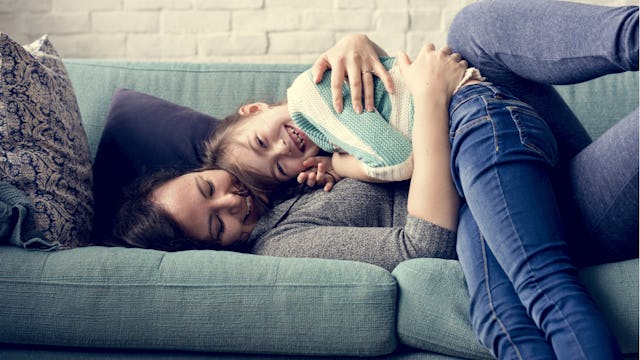One-On-One Time Is Important To My Kids...And To Me

Last night after dinner, as my kids scattered to the four winds to play with the neighbors or ride their bikes before bath time, I found myself alone with my nine-year-old. I had dishes and laundry to tend to, but this seemed like one of those times when they need to go undone in favor of more important things, so I seized the opportunity to hang out with my son, just the two of us.
We sat on the couch together and went through old Facebook pictures and status updates – the modern version of thumbing through photo albums, I guess – and I focused on the ones specific to him, like the time he looked down his pants and yelled, “Mom! I’m getting facial hair!” We laughed and laughed, and I was able to not only reminisce about what an adorable and funny little guy he’d been, but to truly enjoy the witty, whip-smart fourth-grade version too. He leaned against me, soaking in the uninterrupted attention like a sponge. He needed these moments … and so did I.
Like most mothers of multiple children, I can barely hold a conversation with one of my kids without another swooping in to angle for my attention – a question, a tattle, a “Hey mom, look at this!” exclamation. I guess when you’ve got four kids, it’s inevitable — but it’s also frustrating. If I had a nickel for every time I had to say, “Just a minute, please, I’m talking to your brother,” I’d be on a yacht somewhere, waiting for the chef to bring me dinner. They all want a piece of me. And in the interest of convenience (I use that term loosely, but you know what I mean), they’re usually treated as one group: The Kids. We’re taking The Kids to get haircuts. We’re taking The Kids to the carnival. The Kids have appointments for dental cleanings on Wednesday afternoon.
As important as our family unit is, and as easy as it is to lump them into a collective, it’s still a group made up of individuals – and they need me on an individual basis, too. It helps us not only to connect, but it helps me appreciate who they are as individuals, and reminds me of the unique components each of them add to our group. They’re like spices in a recipe, combining to make a wonderful end product, but sometimes their distinct “flavors” are overlooked. They need to feel seen. They need to be heard. They need to know that I recognize their strengths.
When they’re so often handled like a small flock of sheep, it can be hard to make sure that each one gets those needs met – but I prioritize it. Because if I make my kids feel like they’re special and important to me, they’ll be more likely to feel better about themselves. It’s a gift I can give them that increases in value, a priceless return on a small investment.
It doesn’t have to be a huge chunk of time to make a huge difference. I might take one of them shopping with me, and we’ll chat as we fill the cart (with a bazillion dollars’ worth of food they’ll inhale in a few days’ time). One of them might help me with dinner. Or we might spend ten minutes talking as we shoot hoops in the driveway. And every so often I try to alternate doing “bigger” things with them, too, like a solo trip for ice cream.
At night, I perch on the edge of their beds for a few minutes and we talk about random things – it’s amazing how talkative kids will be when they’re trying to stall bedtime. But even these seemingly inconsequential moments are deposits in their emotional bank accounts. And it’s during these times that I find out what’s going on with them and get a gauge of how things are going in their lives, which can be harder and harder to come by as they get older and start responding to questions with one-word answers like “Fine.” It’s a safe space for them to say the things that they’d never admit to, or ask the questions that they’d be too embarrassed to ask, in front of their siblings.
Tissue alert: one day they won’t be living with us anymore. One day, nobody will be vying for my attention. One day, our family unit will look a lot different, a lot more scattered, and we’ll only be together on special occasions. And as important as our family bond is, our individual bonds are even more so – because they won’t always have the whole family to rally around them at once, but they’ll know they can always come to me.
One-on-one time is good for my kids, but it does a world of good for me, too. Because when I strip away the chaos and the needs of the collective, I’m able to see them with the most clarity. I connect with them on a deeper level. I alternate between amazement and pride at what awesome human beings these little people are growing up to be. And in those moments, I experience the kind of joy that makes motherhood exactly what I always dreamed it would be.